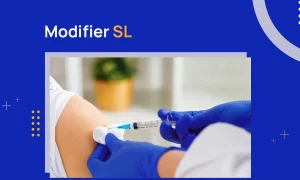Are you stressed about losing your financial stability due to constant claim denials? Well, that is because you are not using the correct CPT codes. We understand that dealing with medical billing and specifically CPT codes is a stressful task.
Which is why we have decided to explain various CPT codes via our comprehensive blog posts. Today, we have chosen CPT code 93015 from the ‘Cardiology CPT Codes’ range. In this blog post, you will find a detailed description of the code with its real-life applications and applicable modifiers. Furthermore, there are specific billing and reimbursement guidelines tailored for this code only. So let’s get started!
What is CPT Code 93015?
The very first question that arises while reading about any CPT code is: What does it represent? CPT code 93015 indicates an overall cardiovascular stress test with supervision, interpretation, and reporting. The test involves high-intensity or medium-intensity treadmill or bicycle activity, with continuous electrocardiogram (ECG) monitoring, and/or pharmaceutical stress.
The cardiologist performs this test in a three-step procedure, including:
- Supervising the test
- Monitoring the ECG
- Interpreting and reporting the results
In simpler terms, the physician analyzes the heart’s response to stress by putting pressure on it through exercise or induced pharmaceutical stress. The provider continuously obtains blood pressure and ECG readings to monitor the heart’s response and check any abnormalities in its performance. In the final step, he evaluates the acquired data and prepares a report summarizing the findings.
Appropriate Use Cases for CPT Code 93015
Let’s understand this test through some real-life scenarios. The following examples will help you understand the practical application of CPT code 93015.
To Detect Coronary Artery Disease
Suppose a 50-year-old patient walks into your clinic. He tells you that he is experiencing shortness of breath and chest pain, even with minimal physical activity. You decide to check for potential coronary artery disease (CAD) since you suspect stable angina. To confirm or rule out this condition and the possibility of CAD, you order a comprehensive diagnostic stress test while the patient jogs on the treadmill. In this instance, you may use CPT code 93015.
For Pre-Cardiac Surgery
Let’s imagine a 68-year-old woman is supposed to undergo a major heart surgery. She had a borderline history of coronary artery disease. So the cardiologist wants to assess her current functional cardiac capacity before major cardiac surgery to ensure that she can handle the procedure and anesthesia. He conducts an overall stress test on her, which includes overseeing the test, interpreting the results, and reporting them. In this case, he can use CPT code 93015 for the reimbursement of his services.
For Follow-Up Visits
Suppose a 70-year-old woman comes to your clinic for her routine wellness checkup with symptoms such as fatigue and dizziness. To detect any underlying cardiac disease, you prescribe a comprehensive stress test (medication-induced). Hence, you can apply CPT 93015 for appropriate billing.
Modifiers to Append with CPT Code 93015
You can apply the following modifiers with CPT code 93015.
Modifier 59
Modifier 59 is appended when the physician has performed another distinct service on the same patient on the same day. So, if another distinct service, such as a test for diabetes, was performed before the cardiovascular stress test, modifier 59 can be appended to CPT code 93015. This will highlight that the service is distinct and separately reimbursable.
However, due to the overuse of this modifier, most insurance payers do not accept this modifier, so it is better to use its subcategories, such as modifier XE.
Modifier XE
This modifier replaces modifier 59 and indicates distinctness due to a separate encounter. So, in other words, appending this modifier to 93015 explains that the comprehensive stress test is distinct and separately reimbursable since it was performed in another session on the same service date.
Reimbursement Guidelines for CPT Code 93015
You must follow these billing and reimbursement guidelines for CPT code 93015 to receive full payments for your services.
Ensure Correct Use of CPT Code 93015
We have highlighted how CPT code 93015 represents a comprehensive cardiography procedure that includes stress testing, monitoring, interpretation, and reporting. However, if you do not perform all of these services, such as testing without interpretation or without providing the reports, this would represent an incorrect usage of the code. It can lead to claim denials, delayed payments, or even audits for overbilling.
So understand that:
- 93015 includes ECG monitoring, physician supervision, results interpretation, and reporting.
- 93016 includes ECG monitoring and supervision only.
- 93017 includes ECG tracing only. The technical component of the stress test.
- 93018 includes physician interpretation and report preparation. The professional component of the stress test.
Append Correct Modifiers (When Necessary)
While appending modifiers with CPT code 93015, it is important to remember that it is a global code. Such codes encompass both the professional (physician supervision, interpretation, and report) and technical (equipment, technician’s time, ECG tracing) components. So, you cannot append the modifiers TC or 26 with this code.
Provide Proper Documentation
Accurate documentation is the foundation of efficient cardiology billing. Your documentation must be thorough and accurate to justify the medical necessity of the cardiovascular stress test.
These are some details you must include with the claim form to support the service’s medical necessity:
- Medical diagnosis supported with ICD-10 codes.
- A documented reason for a comprehensive electrical stress test.
- Interpretation and report of all segments of the service.
- Documented necessity for the test frequency.
- Service date, the name of the referring physician (if applicable), and the reason for referral.
Final Thoughts on CPT Code 93015
By the end of this read, we assume that you must be aware of all the details of CPT code 93015. For example, we covered a few clinical situations where this code is appropriate, including identifying coronary artery disease, evaluating patients before heart surgery, and routine follow-ups.
We also discussed some typically appended modifiers to code 93015 and advised against the misuse of modifier 59. Lastly, the reimbursement guidelines were discussed to alert you to potential mistakes that you or your billers may make.
However, if you are still confused or simply want to avoid the hassle of medical coding, you can hire cardiology billing services. Experts providing these services are pros at protecting your financial gains.
FAQs
Does Medicare cover 93015?
Yes, Medicare covers CPT code 93015. However, it does consider the frequency of stress tests. If the test is performed too frequently or without a clear medical reason, it may not be covered.
Can you bill 93000 and 93015 together?
No, you cannot bill the same patient with CPT codes 93000 and 93015 on the same service date, because code 93000 covers a routine ECG procedure, whereas CPT code 93015 already includes continuous ECG monitoring during the stress test. So, billing these two codes separately on the same service date may trigger a claim duplication denial.



